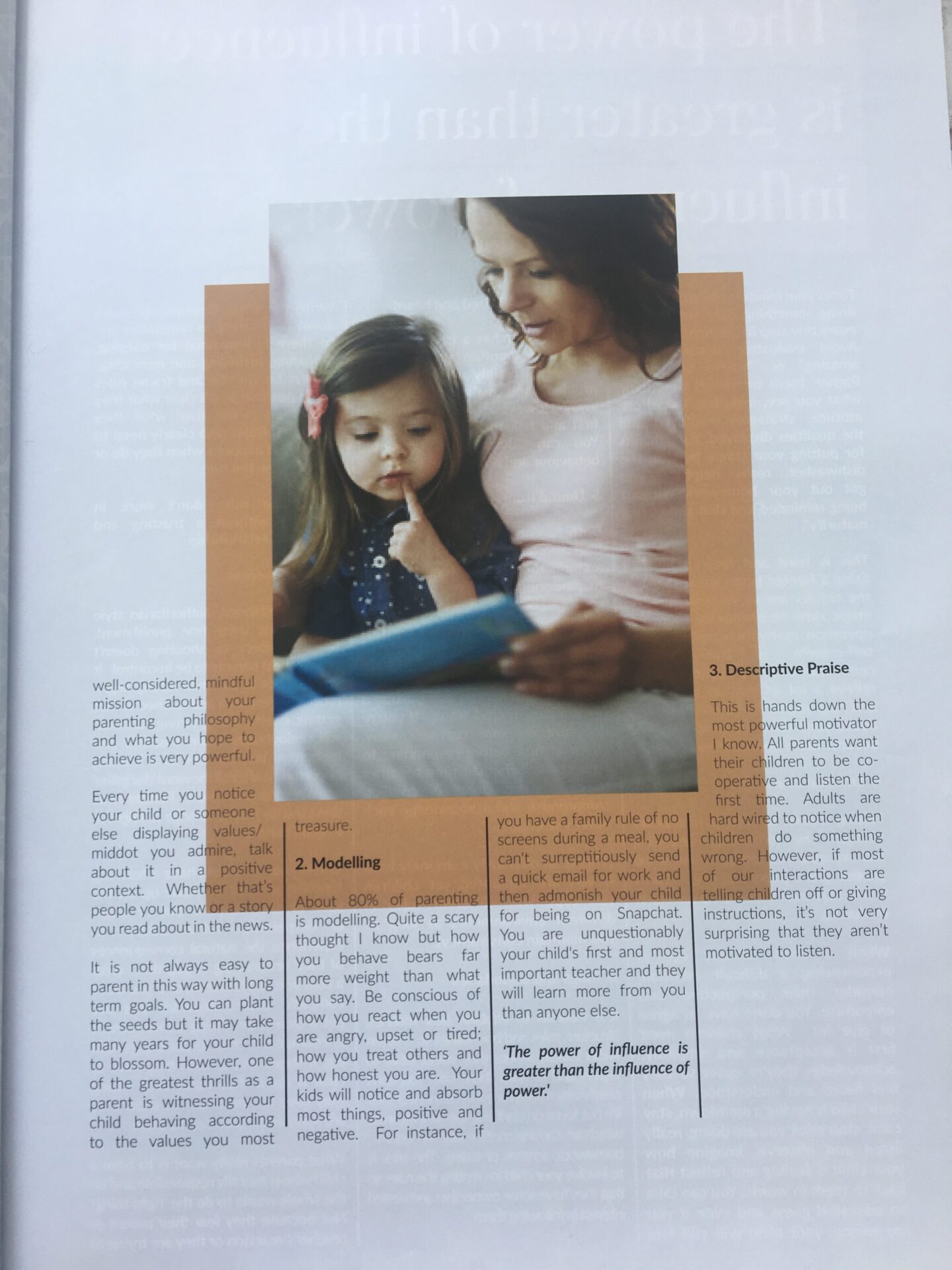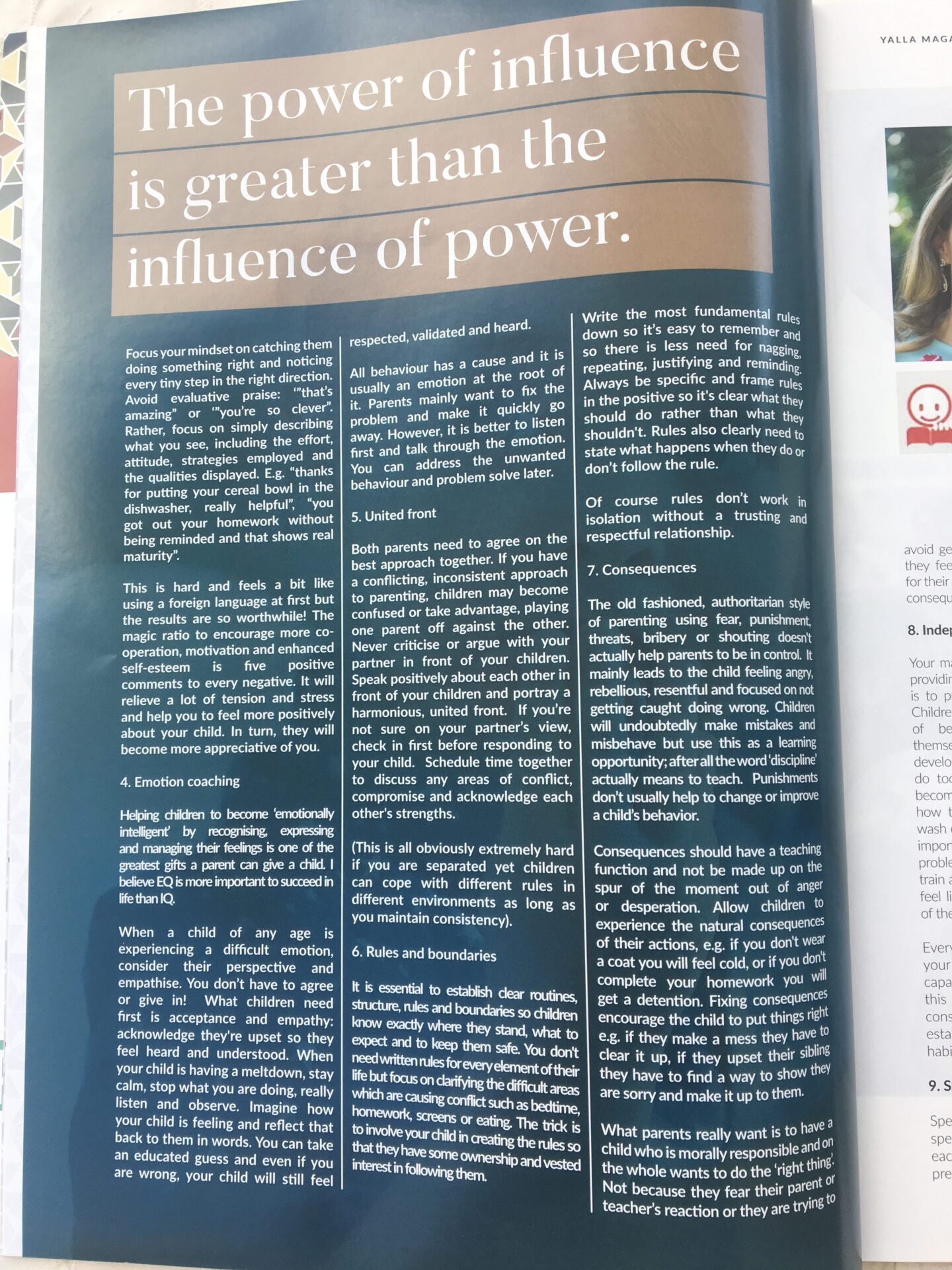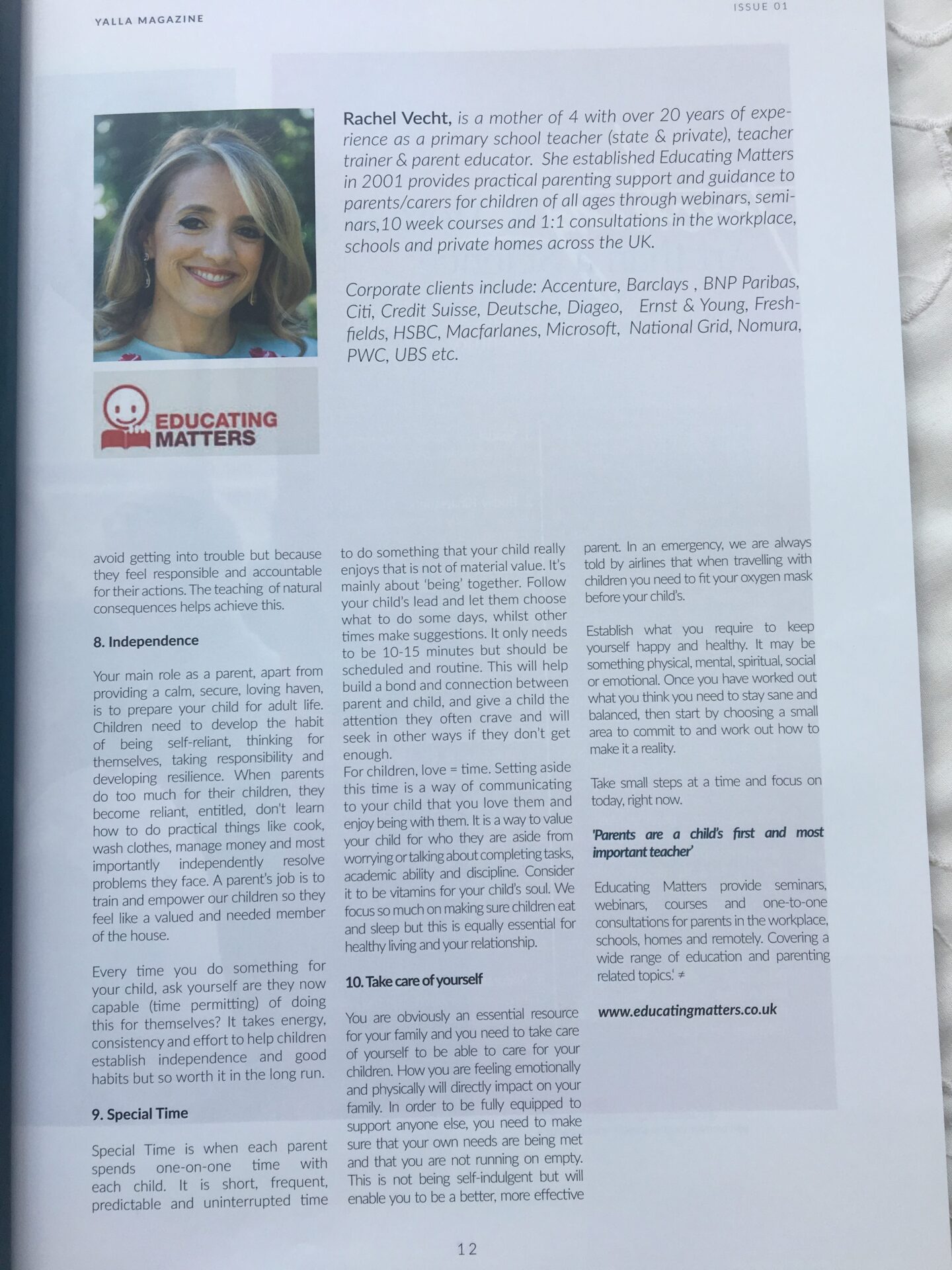There is no such thing as ‘perfect parents’ but with the right tools, parents who understand their children better can raise much happier, more resilient, motivated, independent adults. Being a parent is the most rewarding but difficult job one can ever have, yet it comes with no training.
I am passionate about enabling parents to get the very best out of their children. In 2001 I founded ‘Educating Matters’, (drawing on my extensive experiences as a teacher and being a mother of 4 children) to provide practical support to parents though multiple mediums on a wide range of topics. During this time I have spoken to tens of thousands of parents and discussed most issues and concerns.
It is hard to narrow down but I will attempt to summarise my 10 top parenting tips to help nurture a strong, connected relationship between parent and child. Relationship, communication and connection is the key to ‘Positive Parenting’.
1. Values
To parent in a more purposeful way, it really helps to take the time to create a clear, compelling vision of what you and your family are all about and what your end goal is. The first step is to sit down with your partner and ask some key questions. What is important to you in your life? What are the key qualities or characteristics you would like to see in your children as adults? What will enable “success” for your child? Every family will of course have different views as to what these key values may be.
Then, with your children, create a ‘Family Mission Statement’, outlining what you really want to do and be as a family. Having a well-considered, mindful mission about your parenting philosophy and what you hope to achieve is very powerful.
Every time you notice your child or someone else displaying values you admire, talk about it in a positive context. Whether that’s people you know or a story you read about in the news.
It is not always easy to parent in this way with long term goals. You can plant the seeds but it may take many years for your child to blossom. However, one of the greatest thrills as a parent is witnessing your child behaving according to the values you most treasure.
2. Modelling
About 80% of parenting is modelling. Quite a scary thought I know but how you behave bears far more weight than what you say. Be conscious of how you react when you are angry, upset or tired; how you treat others and how honest you are. Your kids will notice and absorb most things, positive and negative. For instance, if you have a family rule of no screens during a meal, you can’t surreptitiously send a quick email for work and then admonish your child for being on Snapchat. You are unquestionably your child’s first and most important teacher and they will learn more from you than anyone else.
‘The power of influence is greater than the influence of power.’
3. Descriptive Praise
This is hands down the most powerful motivator I know. All parents want their children to be co-operative and listen the first time. Adults are hard wired to notice when children do something wrong. However, if most of our interactions are telling children off or giving instructions, it’s not very surprising that they aren’t motivated to listen. Focus your mindset on catching them doing something right and noticing every tiny step in the right direction. Avoid evaluative praise ‘”That’s amazing” or ‘”You’re so clever” rather focus on simply describing what you see, including the effort, attitude, strategies employed and the qualities displayed. e.g. “Thanks for putting your cereal bowl in the dishwasher, really helpful”, “You got out your homework without being reminded and that shows real maturity”.
This is hard and feels a bit like using a foreign language at first but the results are so worthwhile! The magic ratio to encourage more co-operation, motivation and enhanced self-esteem is 5 positive comments to every negative. It will relieve a lot of tension and stress and help you to feel more positively about your child. In turn they will become more appreciative of you.
4. Emotion coaching
Helping children to become ‘emotionally intelligent’ by recognising, expressing and managing their feelings is one of the greatest gifts a parent can give a child. I believe EQ is more important to succeed in life than IQ.
When a child of any age is experiencing a difficult emotion, consider their perspective and empathise. You don’t have to agree or give in! What children need first is acceptance and empathy: acknowledge their upset so they feel heard and understood. When your child is having a meltdown, stay calm, stop what you are doing, really listen and observe. Imagine how your child is feeling and reflect that back to them in words. You can take an educated guess and even if you are wrong, your child will still feel respected, validated and heard.
All behaviour has a cause and it is usually an emotion at the root of it. Parents mainly want to fix the problem and make it quickly go away. However, it is better to listen first and talk through the emotion. You can address the unwanted behaviour and problem solve later.
5. United front
Both parents need to agree on the best approach together. If you have a conflicting, inconsistent approach to parenting, children may become confused or take advantage, playing one parent off against the other. Never criticise or argue with your partner in front of your children. Speak positively about each other in front of your children and portray a harmonious, united front. If you’re not sure on your partner’s view, check in first before responding to your child. Schedule time together to discuss any areas of conflict, compromise and acknowledge each other’s strengths.
(This is all obviously extremely hard if you are separated yet children can cope with different rules in different environments as long as you maintain consistency).
6. Rules and boundaries
It is essential to establish clear routines, structure, rules and boundaries so children know exactly where they stand, what to expect and to keep them safe. You don’t need written rules for every element of their life but focus on clarifying the difficult areas which are causing conflict such as bedtime, homework, screens or eating. The trick is to involve your child in creating the rules so that they have some ownership and vested interest in following them.
Write the most fundamental rules down so it’s easy to remember and so there is less need for nagging, repeating, justifying and reminding. Always be specific and frame rules in the positive so it’s clear what they should do rather than what they shouldn’t. Rules also clearly need to state what happens when they do or don’t follow the rule.
Of course rules don’t work in isolation without a trusting and respectful relationship.
7. Consequences
The old fashioned, authoritarian style of parenting using fear, punishment, threats, bribery or shouting doesn’t actually help parents to be in control. It mainly leads to the child feeling angry, rebellious, resentful and focused on not getting caught doing wrong. Children will undoubtedly make mistakes and misbehave but use this as a learning opportunity; after all the word ‘discipline’ actually means to teach. Punishments don’t usually help to change or improve a child’s behaviour.
Consequences should have a teaching function and not be made up on the spur of the moment out of anger or desperation. Allow children to experience the natural consequences of their actions e.g. If you don’t wear a coat you will feel cold, or if you don’t complete your homework you will get a detention. Fixing consequences encourage the child to put things right e.g. If they make a mess they have to clear it up, if they upset their sibling they have to find a wat to show they are sorry and make it up to them.
What parents really want is to have a child who is morally responsible and on the whole wants to do the ‘right thing’. Not because they fear their parent or teacher’s reaction or they are trying to avoid getting into trouble but because they feel responsible and accountable for their actions. Natural and teaching consequences help to achieve this.
8. Independence
Your main role as a parent, apart from providing a calm, secure, loving haven is to prepare your child up for adult life. Children need to develop the habit of bring self-reliant, thinking for themselves, taking responsibility and developing resilience. When parents do too much for their children, they become reliant, entitled, don’t learn how to do practical things like cook, wash clothes, manage money and most importantly independently resolve problems they face. A parent’s job is to train and empower our children so they feel like a valued and needed member of the house.
Every time you do something for your child, ask yourself are they now capable (time permitting) of doing this for themselves? It takes energy, consistency and effort to help children establish independence and good habits but so worth it in the long run.
9. Special Time
Special Time is when each parent spends one on one time with each child. It is short, frequent, predictable and uninterrupted time to do something that your child really enjoys that is not of material value. It’s mainly about ‘being’ together. Follow your child’s lead and let them choose what to do some days, whilst other times make suggestions. It only needs to be 10-15 minutes but should be scheduled and routine. This will help build a bond and connection between parent and child, giving a child the attention they often crave and will seek in other ways if they don’t get enough.
For children love =time. Setting aside this time is a way of communicating to your child that you love them and enjoy being with them. It is a way to value your child for who they are aside from worrying or talking about completing tasks, academic ability and discipline. Consider it to be vitamins for your child’s soul. We focus so much on making sure children eat and sleep but this is equally essential for healthy living and your relationship.
10. Take care of yourself
You are obviously an essential resource for your family and you need to take care of yourself to be able to care for your children. How you are feeling emotionally and physically will directly impact on your family. In order to be fully equipped to support anyone else, you need to make sure that your own needs are being met and that you are not running on empty. This is not being self-indulgent but will enable you to be a better, more effective parent. In an emergency, we are always told by airlines that when travelling with children you need to fit your oxygen mask before your child’s.
Establish what you require to keep yourself happy and healthy. It may be something physical, mental, spiritual, social or emotional. Once you have worked out what you think you need to stay sane and balanced, then start by choosing a small area to commit to and work out how to make it a reality.
Take small steps at a time and focus on today, right now.




